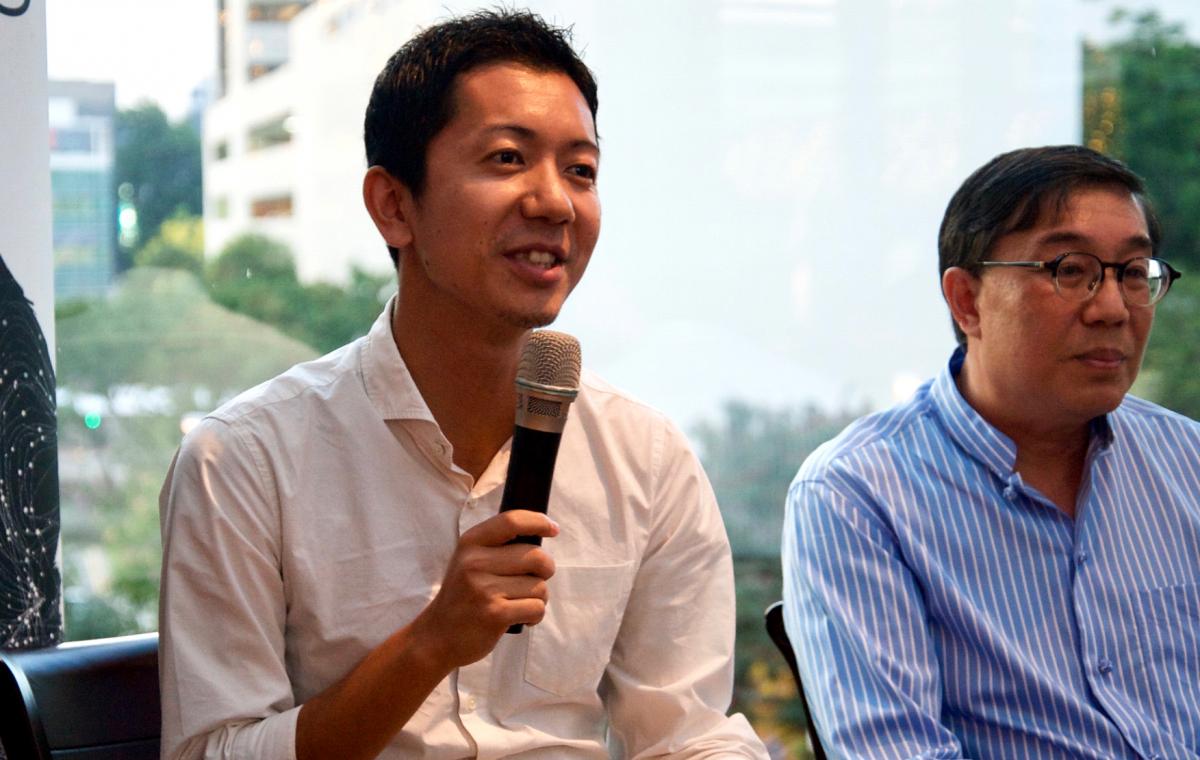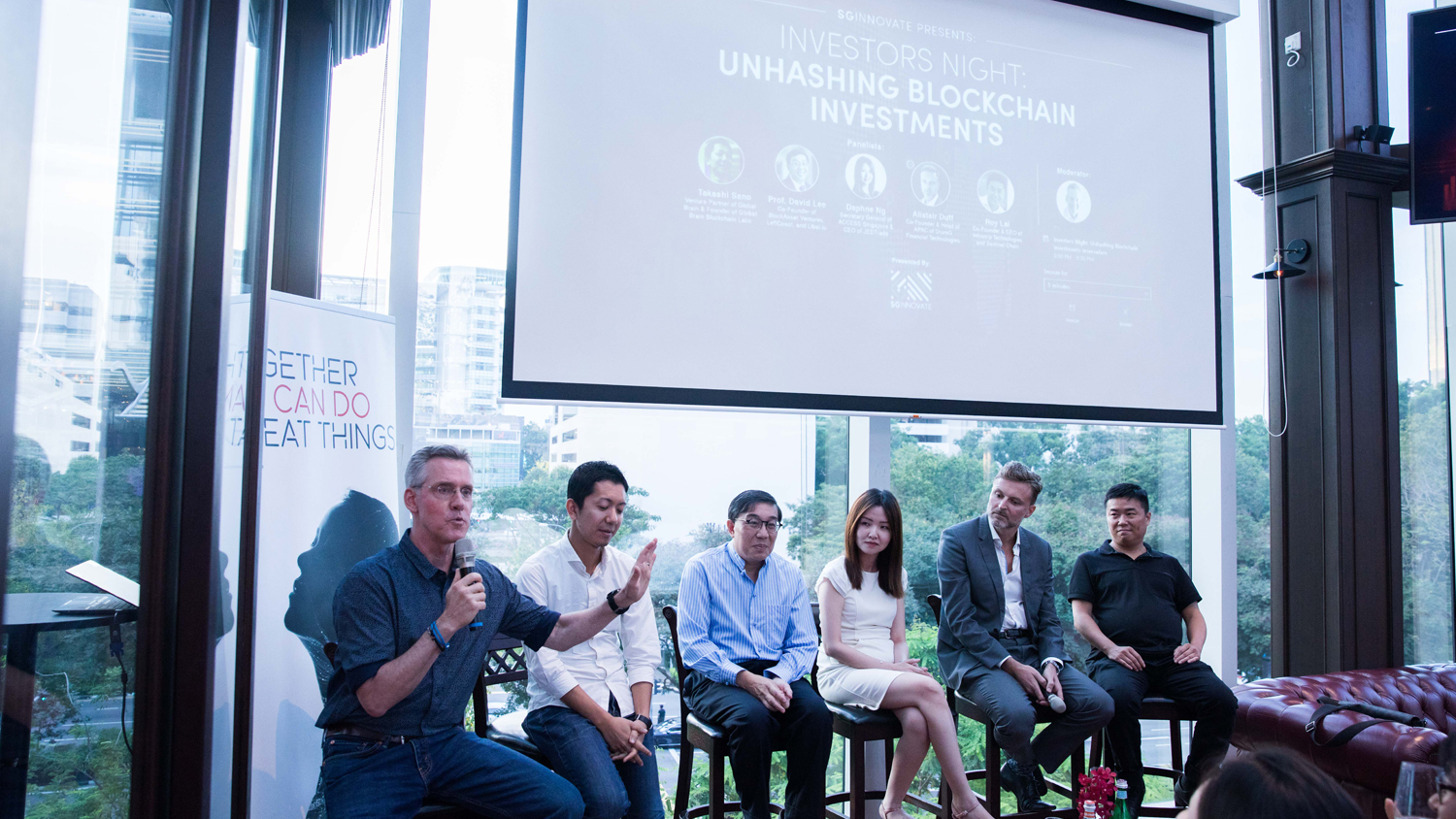Ready, Set, Hash
Thu, 05/10/2018 - 12:00
Blockchain entrepreneurship and investment is more about building an ecosystem rather than cornering the market, said a panel of practitioners at SGInnovate’s Investors Night.
Over the past week, you’ve probably done at least one of the following: made a purchase with a quick tap of a credit card, topped up your transport card at an automated machine, transferred money to a friend, paid your monthly bills online, received your salary via direct deposit, or applied for a loan.
These actions have one thing in common—they all rely on services provided by banks and other financial institutions. But while most people in Singapore and other affluent countries take such services for granted, a staggering two billion people around the world do not have access to a bank account, and are thus cut off from the convenience, security, savings and credit offered by banks.
Now, however, a growing number of entrepreneurs are using blockchain technology to provide financial services to unbanked segments of the population, stoking considerable investor interest in the sector as well.
Blockchain technology focuses on the grassroots—it’s a bottom-up technology as opposed to top-down, so it has great potential to improve financial inclusion for many people on the ground.ROY LAI
Mr Lai, co-founder and CEO of InfoCorp Technologies and CEO of blockchain marketplace Sentinel Chain, was speaking at a panel discussion at SGInnovate’s blockchain-focused Investors Night on 12 April 2018. Moderated by SGInnovate Founding CEO Mr Steve Leonard, the panel also comprised Mr Takashi Sano, venture partner at Global Brain and founder of Global Brain Blockchain Labs; Professor David Lee, co-founder of BlockAsset Ventures and fintech education startups LeftCoast and Libai.io; Ms Daphne Ng, secretary-general of blockchain industry association ACCESS Singapore and CEO of blockchain company JEDTrade; and Mr Alistair Duff, co-founder and head of APAC at DrumG Financial Technologies.
Building an inclusive ecosystem
The goal of financial inclusion is also attractive from the point of view of investors who back such ventures, said Professor Lee. “One way for companies to grow is by inclusion—getting more customers whom you’ve never been able to serve before, who have never been able to enjoy your services before. That is a sustainable way to grow your business.”

 Mr Sano shared about a Philippine fintech startup his company invested in
Mr Sano shared about a Philippine fintech startup his company invested in
Take for example Coins.ph, a fintech startup in the Philippines that Mr Sano’s firm Global Brain invested in. Launched in 2014, the company now has half a million customers using its mobile wallet to send money and make payments without the need for a bank account. “They are really developing great technology, but people who are using it don’t need to know what blockchain is—they just use it because it’s convenient,” said Mr Sano.
Venture capital firms (VCs) now have an expanded role to play in the blockchain space, Mr Sano added, noting that in addition to investing in blockchain companies, his firm now also runs a co-working space for blockchain in Tokyo, and funds grants for blockchain research. “We are acting in many different roles now, not just investment, to build this entire ecosystem,” he said. “From the VC's perspective, it’s not just about investing, but how you contribute to this ecosystem.”
The right kind of regulation
In addition to its use in consumer-facing financial inclusion applications, blockchain technology also has great potential to transform enterprises, said the panel. “While many financial institutions are already using blockchain to reduce compliance and processing costs, it can in fact do much more,” said Professor Lee. Because of the use of tokens as an economic incentive for people to participate in a blockchain system, the technology can even spawn entirely new business models.
Just like autonomous vehicles or any other disruptive technology, the proliferation of blockchain-based business models and initial coin offerings (ICOs) has sparked discussion about how best to regulate the sector—a particularly difficult task given the decentralised nature of blockchain.
As a blockchain entrepreneur who himself has raised money through an ICO, Mr Lai said that he welcomed the idea of regulation, as it would provide clear guidelines much needed by the industry. “Otherwise, we’re stuck in no man’s land. We don’t know whether to move forward or backwards. It’s not good for our industry and it’s not good for everyone, as ICOs can be drivers for innovation,” he said.
ACCESS Singapore, for its part, holds regular dialogues with central banks like the Monetary Authority of Singapore to discuss regulatory frameworks. “We recognise that the technology is still in its early stages. We are advocating self-regulatory frameworks because we don’t want to hamper any innovations from blockchain companies that are forward-looking and have a mission of helping microeconomies,” said Ms Ng.

 Ms Ng spoke about regulatory frameworks in Singapore
Ms Ng spoke about regulatory frameworks in Singapore
Completing, not competing
Although ICOs have become an increasingly popular way for companies to raise money, traditional VCs are still relevant in the startup ecosystem, said the panel.
“It depends on what you’re trying to do and what your business is,” said DrumG’s Mr Duff. Investors like asset managers and banks, he added, tend to view VC funding more favourably. “For them, there is actually some negative signal around ICOs. The feedback I've heard from banks is that being backed by a strong VC is actually a good brand.”
According to Professor Lee, the two funding models target very different sets of entrepreneurs and investors. While VCs tend to place the most focus on a company’s business model, token investors have a range of additional concerns. “How does your project complete the ecosystem? Do you contribute to the community? Do you have the compassion and creativity? If you’re the best programmer but you don’t have any of this, then it’s going to be very difficult,” he said.
“In the token world, it is not about competing against each other. It’s about completing each other,” concluded Professor Lee.
SGInnovate Investors Night series aims to bring together the community of venture capitalist (VCs), angel investors, and corporate VCs for thought leadership discussions, knowledge sharing, and networking.
Aside from Investors Night series, we also host many events in artificial intelligence, medtech, blockchain and more. Join our community to be the first to know about all our latest happenings!
Trending Posts
- From satellites to startups, Singapore’s space sector is pushing new frontiers
- How leaders should rethink cybersecurity strategy
- How to Future-Proof a Career in Deep Tech? Start here.
- The future of fusion energy: What will it take to bring the power of the stars to earth?
- Keeping satellites safe: How CYSAT Asia 2026 is tackling space cybersecurity






